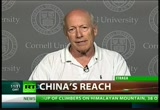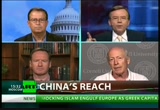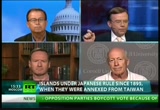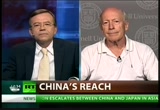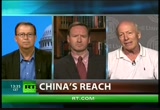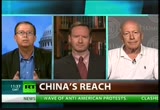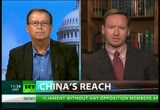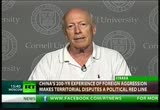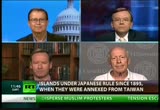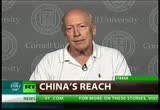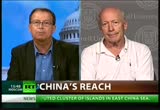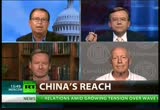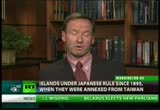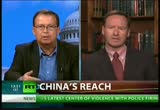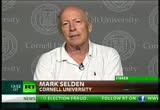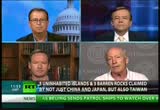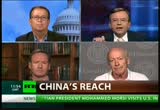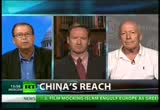tv [untitled] September 24, 2012 7:30am-8:00am EDT
7:30 am
welcome to cross talk a little about is it merely a squabble over a bunch of rocks in the pacific or beijing's projection of power the growing competition for sovereign control over a number of pacific islands highlights the growing instability among important trading partners what is driving this competition nationalism at home or all important geopolitical interests. to cross-talk this island dispute i'm joined by bruce clinger in washington he's a senior research fellow at the heritage foundation also in washington we have brian becker he is the national coordinator of the answer coalition and it is we
7:31 am
cross the mark selden he is a senior research associate in the east asia program at cornell university all right gentlemen crosstalk rules in effect that means you can jump anytime you want to market how would you characterize what's going on between china and its neighbors and all of these disputes in particular the one that's going on in the pacific right now well i'd like to begin by locating it within a series of territorial disputes in the asia pacific seeds this means we're not just talking about it china japan dispute we're also talking about a japan korea dispute over duck though we're talking about japan ongoing disputes with russia over the northern islands as the japanese call them we're talking about disputes in the south china seas between china vietnam the philippines and others so something is going on very large and significant around territorial issues in in the asia pacific and i'm going to come back to talk about why this is and why now
7:32 am
but secondly we're talking about the. the rise of nationalism as a response to these issues nationalism that's driven by competing territorial claims yes but is also driven by historical memory issues centering on war and colonialism this is why the issues are so fraught in both trying to argue i could jump in here and i said earlier if i go to brian a piece and i go to brian it sounds like china has a lot of problems with its neighbors if we just going to consider what mark just said go ahead. oh yes china has problems with its neighbors it also has problems with the united states which just went to japan and to announce the creation of a second missile defense shield that china interprets to be a threat to china as it should interpret it i think what we see here in this case with these islands is that the japanese government the federal government under pressure from right wing nationalists in tokyo and elsewhere has engaged in a provocation buying the islands from japanese businessmen who don't own them and
7:33 am
then trying to create a fait accompli for the chinese and obviously the chinese people with strong anti colonial sentiments recognizing that these islands were seized at the same time as taiwan was seized in one thousand nine hundred five are up in arms in protests around the country but i think it's from below it's from the masses of people but obviously it's also from the chinese government in the chinese media ok bruce it's trying to getting a raw deal in all of this because it's all against china. oh it's not all against china it's certainly there's the dispute between south korea and japan and japan and russia so there are a number of issues and. the reasons for it really are all of the there's the longstanding territorial disputes it's flavored with historic animosities given the japanese actions in the last century there's also rising nationalism particularly in china and we're also seeing it in japan and korea and then also what makes this
7:34 am
different from the similar incidents in two thousand and five two thousand and six is that beijing's much more willing to assert itself in the past and that's what led secretary panetta to express concern that particularly the issue between japan and china could get out of hand even inadvertent clashes which always have the danger of escalating further market is if the united states reluctantly being dragged into this or is it happy that it has proxies to contain china. you know well. what's the sequence of events that we're looking at here we're looking at a multiple series of events one is the obama administration signaling a greater united states role a greater american tilt toward toward the asia pacific but we're also looking at rising nationalism all across the region no. i'm not of the view that we should lay this a china is footsteps it seems to me that the latest series of incidents basically
7:35 am
begins with the governor of tokyo you see how does making a bid for the islands and then forcing the japanese government to follow suit they've now bought the islands for twenty six million dollars this is throwing the . flame in the direction of china and it's not surprising that exactly at the season when chinese respond to the anniversary of the manchurian incident when japan created mantua chinese nationalism is aflame again so i think we have a series of interactive events in which the united states finds itself a party to a set of issues and is now in the very uncomfortable position as to whether it will support the pan as the japanese government has pressed it to or whether it will try to cool the situation in the region and i hear the united states talking in both of
7:36 am
these directions i'm not sure which way it will go but this situation is opened up precisely because some of the talk has been to frame this in terms of u.s. china conflict which is on the horizon for the presidential election as we know on many fronts and we'll get and will continue to intensify in the coming months brian if i can go back to you i mean if the japanese have these guarantees from the united states and they can act in a. evocative way buying these i exactly i i don't think that i and i think that this happened right before panetta went to china i don't think japan is acting independently i think this is part of a script of course japan has its own internal political situation and its own regional interests but let's look at the whole big picture let's step back you had president obama going to australia announcing the pivot towards asia which means the militarization of the u.s. role in asia he's just announced the ninth trade lawsuit against china he did that
7:37 am
in ohio pandering of course to ohio voters but that's the ninth lawsuit not the first and at the same time you have the u.s. cementing its military relationship with japan which can only be viewed in a threatening way by china and especially now with the second missile defense shield so i think the united states is now on one hand pretending to be sort of diplomatically in the middle and hoping both sides speak softly and don't carry a big stick but behind the scenes i think the united states is really working with japan to create more tension and more pressure on china especially as china is going through its leadership transition ok bruce i saw you shaking your head so go right ahead yeah i think we can look at it both tactically and strategically at the tactical level all these various disputes in washington both publicly and privately is is trying to maintain a strictly neutral position on sovereignty issues we don't have a dog in the fight particularly i don't know you really believe that really true we
7:38 am
don't have a. six was a shell when i went to the so you know do you mean by lateral relations with vietnam all of that is directed against the people's republic of china that is why that's why i distinguish between tactical and strategic on the purely sovereignty issue over which country has sovereignty or jurisdiction over an island the american government has clearly said we take. no position we are neutral in each of those disputes the aspect that the u.s. also indicates those we want every dispute to be resolved peaceably on the strategic level the reason one of the reasons behind the asia pivot as the obama administration calls it has been a growing concern not only by the united states but by asian nations japan south korea australia throughout southeast asia about a growing beijing's assertiveness some would say aggressiveness willing to use intimidation against smaller nations particularly in southeast asia and that goes
7:39 am
back to the two thousand and ten out of cocker's and incident the you know all that so the u.s. is increasingly concerned about what chinese intentions or actions might be and that was one of the reasons behind the interest in re prioritization toward asia go ahead brian. how could one possibly sit here grumpy and with a straight face to say within say that the united saying that the united states is concerned about the feelings of nations in southeast asia for instance and that's why it's coming to their aid because they feel china is bullying them the united states killed two million vietnamese and a lot of cambodians and a lot of other laotians this is part of a geo strategic move by the united states to contain china which it seems the emerging as a major economic and military competition when president obama came into office he tried to tone down the language of george w. bush the language of competition but he's right back in it almost with the identical position of bush at this point in the in the administration ok mark you
7:40 am
want to jump in there go ahead. e.-s. i do i think that there is one very specific issue that needs clarifying here and that is the response. of the united states to china japan conflict immediately when it broke japan's foreign minister at that time i had to restrain washington and met with hillary clinton the next day and asked for support and specifically asked that the united states would make a statement indicating that the united states view this viewed china's claim on. whose as a violation that the united states would treat this under the treaty under the u.s. japan security treaty and would protect you under it so i don't think you can be said the united states has maintained neutrality on this on the other hand it's
7:41 am
also the case as bruce has suggested that a number of statements did come out of the pentagon out of the state department saying the united states doesn't have an official position on the islands themselves but if we go back historically if we go back to the disposition of these islands and. other territories after world war two we have to pay attention to the crucial crucial role that the united states played in making all of the territories that we now are looking at this was the san francisco treaty of one nine hundred fifty one china was excluded from it and in that treaty what the united states did was to create all across the asia pacific a series of decisions about ownership without at any point spelling out the latitude longitude specifics of where the boundaries ended own burning it's very interesting for we're going to go to a short break and return to history here after a short break we'll continue our discussion on the island dispute state party.
7:42 am
7:43 am
favorites from matsushita t.v. is not required to watch on t.v. all you need is your old low ball device to watch ati any time of the. courageous and creative. elegance and fold of public speaking. that's our united front. a few european bodybuilders against millions of weak immigrants. which may not seem so serious now. but this could be a real threat to. european extremists. on call to get off sometimes you see a story and it seems so you think you understand it and then you glimpse something
7:44 am
7:45 am
7:46 am
ok bruce and i think go back to you has china been dealt a raw deal i mean if we in the light of what mark said before we went to the break i mean after the second world war all these things things were decided without china participating. well i think you can argue that china you know was dealt a raw deal but at the time it was not a member of the un etc but i think if you look at the present time the concern that the u.s. has and as i said before the nations of southeast asia northeast asia you know certainly called washington expressing their concern calling for a larger u.s. presence a larger u.s. role because of china's actions recently and they are concerned that china will continue to try to intimidate them to so the u.s. obviously is bound by treaty to defend certain nations japan south korea the philippines etc so on the one hand the u.s. is is trying to maintain a neutral position on the sovereignty of the who owns which rock in the ocean issue
7:47 am
but we also obviously have different relationships with the nations in the area we're certainly bound by treaty to some of them and if if push comes to shove then we are allies in which which certainly we are not with china but we're also trying to maintain all these little sovereignty she has the heart of the u.s. as collating is sometimes large let me play marco had john mark go ahead and really is whether. a forward united states' position for united states military position on this and other conflicts in the region is the best way to move from the period we're now in mutual shouting of nationalism upsurge of territorial conflicts whether a more fruitful approach is one in which the nations involved in these territorial disputes and that extend from china japan and korea to as you and find ways to sit
7:48 am
down out of the out of the glare of of the demonstrators and out of the glare of the media and work out i solutions out of right. and i think of course the peoples of the people's republic of china and i think the other nations in the region do want a negotiated settlement they don't want a rise of military tensions that's now what they really want net certainly not what the people's republic of china's foreign policy has been signaling i think though that we have to step back and look again to the obama administration and see the u.s. role here and see it clearly when the u.s. said it was pivoting towards asia what they really meant is that they were reaping towards asia because that was the pivot that was the focus of u.s. foreign policy for a long time. in one thousand one the united states invaded the philippines as part of the opening to asia and most of world war two the war was fought in asia for the
7:49 am
united states then there was the korean war then the vietnam war war after war after war where the focus the pivot of u.s. foreign policy was towards asia then it was the middle east for the last two decades and now the us is we oriented its military hardware towards asia that's a dangerous thing given the historical precedent of what the pivot or focus on asia has meant and china is well aware of this they're threatened by japan because of japan's historic role as the colonizer and butcher of china but they're also threatened now by a u.s. japanese military alliance which in spite of its desire china's desire for a diplomatic solution a diplomatic resolution a peaceful road is being threatened by this cementing relationship and given the history we can see that they have good reason to feel threatened ok bruce you know i would immediately talking about the rising of nationalism in china just a second the answer is the rise of nationalism in china but if a country feels encircled then you get nationalism don't you i mean it's kind of
7:50 am
logical. well when we talk about his resume and so you know the u.s. japanese alliance with a resurgent u.s. japanese alliance it's been in place for decades and certainly japan was militaristic in the early half of the last century but since then they've had they've been clearly pacifist in their nature the u.s. has actually been trying to get japan to do more for its own self-defense as well as to address issues of common international concern overseas. the u.s. military forces are in south korea given in response to the north korean invasion in one thousand nine hundred fifty there in japan both for the defense of japan and as part of the treaty to maintain peace and stability in asia and many of the bases in japan are also directed for a korean contingency. knew the asia pivot the obama's ration really isn't a pivot. not even
7:51 am
a rebalancing as the obama administration claims because there's no change in forces well what we have is there are you. can see they're bringing you know the u.s. navy the u.s. air force is growing exponentially over the next two years in terms of the asia pacific region and the u.s. if you look at what. you do pointed to jar when it's part of the unit deployment program which is a lawyer next to me where the next twenty years the next ten or twenty years this is where it's going in terms of the organization you're really very bored down in u.s. forces overall ok you have given the five hundred billion dollars and an additional five maybe it was running against russia and in the now you have maybe the drawdown a number of troops but the pentagon is still and will be as we will see a dominant force in the political calculations as well as the military calculations of us what are the policy going to be to be. sure where it will continue to shrink
7:52 am
ok mark because i want to hear you're not only going to mark i'd like to go back to mark i mean these are important trading partners at the same time i mean this is what's really odd about it because you know i was at the apec summit and lot of us stuck you know on a lot of talk about trade and now we have the violence there how do they square that circle. mark you know. well obviously these are in direct conflict with each other japan has just put out twenty five million dollars to buy a series of rocks and in the process jeopardizing the multi-billion dollar trade relationship japan's largest trade relationship with with china and the question is whether. whether sound voices on both sides can recognize the higher stakes of those issues but i want to i want to put the the island issues we've been talking about in a wider economic framework as well than you know are much of our heated discussion
7:53 am
has been about the u.s. military but i think the economic stakes are interesting to look at as well what we're looking at is a changing regime in dividing up the oceans on a world scale and i think if we try to understand both the behavior of china and japan a good place to start to understand that is to think about the division of the seas since one thousand nine hundred two united nations convention on the law of the seas and to look at who are the winners and who are the losers well the big winners you might be surprised to know or perhaps not where the where the great colonial powers britain france the united states japan the major loser in the division of the seas has been china so this back with the background to the did the spirits of the islands comes again in a series of steps in which china has experienced large losses what does this specifically mean it means that each island comes each rock that is the cleared an
7:54 am
island comes with two hundred nautical miles of exclusive economic zones and what china is experiencing is a tremendous loss of access to the seas and japan in the united states have been among the major beneficiaries of this new law owner interesting let me night meeting which is here bruce our i mean you know that means we're. not entry or even while a tazer that i care for the chinese to react to that way in history. well it depends on how you go about trying to resolve it i mean right now in the. issue it's japan is not the one making military threats it's china japan korea us and others are you know in our. japan created the provocation why in japan do that right because they're the same caucus it was it in two i don't really need to. you know not one of japan versus china but rather of japan in the united states versus
7:55 am
china in inner cities as well no it's not washington or tokyo or say ninety three strains of a new member of the chinese leadership in a fever of japan and it's time. and you want to jump in there the u.s. and. i think it's a sure thing as you and i think what's going on here and i think it's quite clear that it's quite clear that japan and the united states have a long time military allies that they have a joint economic project japan is something of a junior partner to the united states in the region and globally and it has been such since one thousand nine hundred five i think that what's happening is that china is being denied access to the sea it is being denied systematically and through new provocations this one being the latest access to resources that china considers to be necessary for its development i believe that if the united states
7:56 am
were not a major factor in the calculations going on in the middle east the countries of the region would actually find a negotiated settlement i think the united states doesn't have anything to lose by doing this it creates provocations and then says to the others well you should speak nicely to each other be mediating and find a peaceful solution but in the bottom the final the bottom line of the thing is that the united states is intensifying through its relationship with japan more and more and more pressure on china in this region of the world ok bruce somebody give you a last word fifteen seconds go ahead. i think it's ridiculous the u.s. is trying to mediate a situation here to calm a situation clearly we didn't instigate this in khaki's issue here nor are we instigating alright i mostly where i go out anything today to my guests in washington and i need to cut and thanks to our viewers for watching us here at our d.c. next time remember i'll stop. it
7:57 am
7:58 am
7:59 am
the french invasion of russia has started again after two hundred years up at the. jet the emperor napoleon has arrived from overseas to lead the army i have to really take my time to prepare myself to get it right i know we. the bloody battle near moscow is going to start over. james brown will reveal the victor the soldiers are back to do it all again. but you know version twenty four hours on r.t. . well into the. series.
24 Views
Uploaded by TV Archive on

 Live Music Archive
Live Music Archive Librivox Free Audio
Librivox Free Audio Metropolitan Museum
Metropolitan Museum Cleveland Museum of Art
Cleveland Museum of Art Internet Arcade
Internet Arcade Console Living Room
Console Living Room Books to Borrow
Books to Borrow Open Library
Open Library TV News
TV News Understanding 9/11
Understanding 9/11
